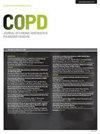Respiratory Infection Triggering Severe Acute Exacerbations of Chronic Obstructive Pulmonary Disease
IF 3.1
3区 医学
Q1 Medicine
International Journal of Chronic Obstructive Pulmonary Disease
Pub Date : 2024-02-27
DOI:10.2147/copd.s447162
引用次数: 0
Abstract
Background: Data are scarce on respiratory infections during severe acute exacerbation of chronic obstructive pulmonary disease (COPD). This study aimed to investigate respiratory infection patterns in the intensive care unit (ICU) and identify variables associated with infection type and patient outcome.Methods: A retrospective, single-centre cohort study. All patients admitted (2015– 2021) to our ICU for severe acute exacerbation of COPD were included. Logistic multivariable regression analysis was performed to predict factors associated with infection and assess the association between infection and outcome.
Results: We included 473 patients: 288 (60.9%) had respiratory infection and 139 (29.4%) required invasive mechanical ventilation. Eighty-nine (30.9%) had viral, 81 (28.1%) bacterial, 34 (11.8%) mixed, and 84 (29.2%) undocumented infections. Forty-seven (9.9%) patients died in the ICU and 67 (14.2%) in hospital. Factors associated with respiratory infection were temperature (odds ratio [+1°C]=1.43, P= 0.008) and blood neutrophils (1.07, P= 0.002). Male sex (2.21, P= 0.02) and blood neutrophils were associated with bacterial infection (1.06, P= 0.04). In a multivariable analysis, pneumonia (cause-specific hazard=1.75, P= 0.005), respiratory rate (1.17, P=0.04), arterial partial pressure of carbon-dioxide (1.08, P= 0.04), and lactate (1.14, P= 0.02) were associated with the need for invasive MV. Age (1.03, P= 0.03), immunodeficiency (1.96, P= 0.02), and altered performance status (1.78, P= 0.002) were associated with hospital mortality.
Conclusions: Respiratory infections, 39.9% of which were bacterial, were the main cause of severe acute exacerbation of COPD. Body temperature and blood neutrophils were single markers of infection. Pneumonia was associated with the need for invasive mechanical ventilation but not with hospital mortality, as opposed to age, immunodeficiency, and altered performance status.
Plain Language Summary: - This study investigates the prevalence, characteristics, and impact on outcomes of different types of respiratory infections triggering severe acute exacerbations of COPD.- Our retrospective cohort study of 473 critically ill patients found that respiratory infections, of which 39.9% were bacterial, were the main cause of severe exacerbation.- The type of infection (viral, bacterial, or mixt) was not associated with the need for invasive mechanical ventilation or mortality.- Early identification of the infectious agent is crucial for implementing effective therapy; however, the type of infection was not associated with the main outcomes.
引发慢性阻塞性肺病严重急性加重的呼吸道感染
背景:有关慢性阻塞性肺疾病(COPD)严重急性加重期呼吸道感染的数据很少。本研究旨在调查重症监护病房(ICU)的呼吸道感染模式,并确定与感染类型和患者预后相关的变量:回顾性单中心队列研究。所有因慢性阻塞性肺疾病严重急性加重而入住重症监护室的患者(2015-2021年)均被纳入研究。采用逻辑多变量回归分析预测感染相关因素,并评估感染与预后之间的关联:我们共纳入了 473 名患者:288人(60.9%)患有呼吸道感染,139人(29.4%)需要进行有创机械通气。其中 89 例(30.9%)为病毒感染,81 例(28.1%)为细菌感染,34 例(11.8%)为混合感染,84 例(29.2%)为无记录感染。47名(9.9%)患者死于重症监护病房,67名(14.2%)患者死于医院。与呼吸道感染相关的因素有体温(几率比[+1°C]=1.43,P= 0.008)和血液中性粒细胞(1.07,P= 0.002)。男性性别(2.21,P= 0.02)和血液中性粒细胞与细菌感染相关(1.06,P= 0.04)。在多变量分析中,肺炎(特异性病因危险度=1.75,P= 0.005)、呼吸频率(1.17,P=0.04)、动脉二氧化碳分压(1.08,P= 0.04)和乳酸(1.14,P= 0.02)与需要进行有创中压治疗有关。年龄(1.03,P= 0.03)、免疫缺陷(1.96,P= 0.02)和表现状态改变(1.78,P= 0.002)与住院死亡率有关:呼吸道感染是慢性阻塞性肺病严重急性加重的主要原因,其中39.9%为细菌感染。体温和血液中性粒细胞是感染的单一指标。肺炎与有创机械通气的需求有关,但与住院死亡率无关,而与年龄、免疫缺陷和表现状态改变无关。我们对 473 名重症患者进行的回顾性队列研究发现,呼吸道感染(其中 39.9% 为细菌感染)是导致严重病情恶化的主要原因。
本文章由计算机程序翻译,如有差异,请以英文原文为准。
求助全文
约1分钟内获得全文
求助全文
来源期刊

International Journal of Chronic Obstructive Pulmonary Disease
RESPIRATORY SYSTEM-
CiteScore
5.10
自引率
10.70%
发文量
372
审稿时长
16 weeks
期刊介绍:
An international, peer-reviewed journal of therapeutics and pharmacology focusing on concise rapid reporting of clinical studies and reviews in COPD. Special focus will be given to the pathophysiological processes underlying the disease, intervention programs, patient focused education, and self management protocols. This journal is directed at specialists and healthcare professionals
 求助内容:
求助内容: 应助结果提醒方式:
应助结果提醒方式:


